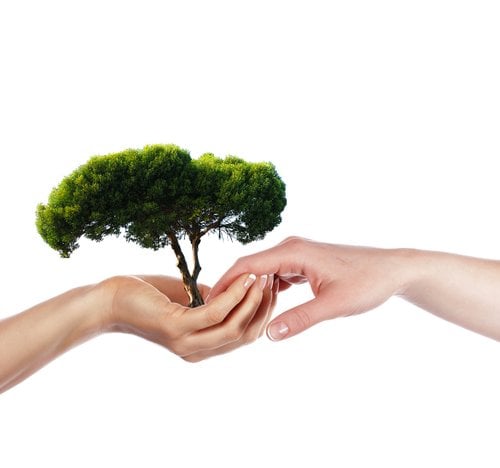The Green Housewives of Morris and Essex Counties
These three women are standouts, but not for table flipping, hair pulling or extravagant shopping sprees. They are too busy saving the planet, one eco-friendly step at a time—and inspiring others along the way.

Kristy Ranieri: Going Green with Sustainability
It was living for several years in San Francisco, prior to making Maplewood her home, that took Kristy Ranieri’s ecological awareness to a new level. “Everyone was concerned about water quality and recycling. Every apartment had multiple recycling cans, and reducing waste was really big there before anywhere else,” explains Ranieri,43. “I guess I began modeling my behavior on what I saw.” It was also in San Francisco that Ranieri began working for Circlepoint, a communications and environmental planning consulting firm that primarily works with government agencies to help them to inform, educate and involve the general public in their prosocial initiatives. “Through my work and becoming a mother, I’ve grown much more aware of and passionate about caring for our environment,” she says.
One of Ranieri’s local clients is Sustainable Jersey, a two-year-old program that helps New Jersey towns go green. Towns that become “Sustainable Jersey-certified” are recognized at an annual awards ceremony. The certification has become prestigious—and competitive. Ranieri says, “Each mayor is trying to out-green all the others!”

Ranieri’s own hometown of Maplewood was among the first to become Sustainable Jersey-certified. She helps the town stay eco-smart as a principal member of the Maplewood Green Team, a group of volunteers who are passionate about promoting sustainability. The group’s projects include the annual Maplewood Green Day, an event dedicated to educating citizens about how to implement eco practices and sustainable solutions into their everyday lives, and the Maplewood Green Challenge, which asks each Maplewood household to pledge to take at least five actions (such as switching to energy-efficient lightbulbs) to reduce its carbon footprint.
Next up for Ranieri: sustainability in the Maplewood schools. “One day my son came home from preschool quite upset that he didn’t get a turn to go toss garbage into the trash bin,” Ranieri recalls. He’d had no trash to dispose of because Ranieri makes her children “no-waste lunches” without disposable packaging or utensils. Her son’s reaction motivated her to begin working with the school to come up with a campaign to encourage other parents to make no-waste lunches. “Soon no child will have a reason to visit the trash bin,” she says.
Sustainable Jersey is a voluntary certification program for towns in New Jersey that want to become more green and sustainable. Towns must agree to take certain actions, such as supporting local farmers or agreeing to conserve water usage, to reach the minimum points required for certification. Sustainable Jersey provides towns with specific guidance and access to grants—the organization has distributed more than $500,000 to New Jersey communities to help them achieve certification.
Carcich with her two children and playmates at her weekly playgroup.
Jennifer Carcich: Going Green by Recycling
Living ecologically is all Morristown resident Jennifer Carcich, 38, has ever known. “I was born to hippies,” she says. “They instilled in me a pride in myself, the community and the earth.
The fact that money was tight also contributed to the family’s resourcefulness. “I was never raised to be a consumer,” says Carcich. “We always ate from our garden. We always composted. My mom made a lot of our clothes and we wore hand-me-downs.”
Now that she’s a mother herself, Carcich lessens her family’s environmental impact by regularly composting and gardening and landscaping organically and using washcloths instead of baby wipes and cloths in place of paper napkins and towels. Her family uses homemade, all-natural household cleaning solutions, washable plates, utensils and cups (even for big parties), refillable water bottles and energy-saving lightbulbs.
To lesson her carbon footprint, Carcich also truly “runs” her errands. “I take my two youngest in the double jogger and stop at the grocery store, the bank and the post office,” she explains. But Carcich’s commitment to the earth goes beyond her own home practices. Six years ago she formed Morristown Moms & Tots & More (MATAM), an eco-minded community group that started with just three families and has expanded to 210. The group holds weekly discussions using guides from the Northwest Earth Institute, with topics like “Voluntary Simplicity” and “Healthy Planet, Healthy Children.” It also conducts an annual exchange and giveaway of gently used toys and has organized a system for members to trade magazines and clean local playgrounds.
Perhaps the group’s most impressive accomplishment has been convincing Morristown to become the first town in New Jersey to accept expired or damaged car seats into its recycling program. “Child/infant car seats are made of number-five plastic,” says Carcich. “When the town began collecting plastics one through seven, I jumped at the chance to make sure that disassembled car seats would be included.” After many phone calls and letters, Morristown agreed to accept all metal and plastic from the car seats, picking them up curbside along with the rest of the recycling. “I was shocked at how willing to help our local government was and how smoothly the entire process went,” she says. “It made me so proud of where I live, and it felt so great to know that a small number of voices could make a big change for the better!“
After hearing of Morristown’s success, Morris Township followed suit. “I have fielded calls and e-mails from all over the globe about this program,” says Carcich. For anyone looking to establish a car-seat recycling program, Carcich recommends doing your homework first. “Find a recycling company that will take number-five plastics before you even contact your local government,” she says. “Try asking local automotive shops about the recycling company they use.”
Jennifer Chaky: Going Green in Business
Montclair resident Jennifer Chaky, 37, credits her mother for teaching her ecological values. “She was the type who would leave things that could be recycled in the back of her car and make it her business to take them to a recycling facility,” explains Chaky. “Growing up, we were always recycling and conserving water and electricity.” This instilled in Chaky a commitment to doing whatever she could to improve the planet. “When you have that mentality,” she says, “you go through life looking to learn about more things you could do better.”
Often it is Chaky who is sharing her knowledge with others as the owner of Go Lightly, a Montclair store that carries an array of eco-friendly products, from basics such as refillable bottles and green cleaning and beauty products to unique and inspired gifts like Vinylux bowls made of molded vinyl records and cuff bracelets made from recycled license plates. Chaky also writes about greener living on her website, golightlystore.com.
“Three years ago, when I first thought about starting my business, I wondered if there would be enough to fill a store,” says Chaky. “Now I could fill a department store—I wish I could carry all the great things I see!” Living green is not only accessible, but also affordable, Chaky insists: “Someone recently said to me that a green dishwasher detergent may be great for the environment, but not everyone could afford it,” she says. “But actually the big container of mainstream brand dishwasher detergent comes out to 23 cents a load, and what I sell, which is super-concentrated and in a much smaller container, is 16 cents a load!”
Chaky recently made a dramatic decision to go carless. “I shop locally at nearby independent stores for almost everything,” she explains. “So when my car lease came up last September, I didn’t renew.” She’s discovered a bonus to biking and walking: It builds community. “My friend bikes to pick up her son every day and often stops in the store to say hi,” she says. “Then one week she was lent a car, and I literally didn’t see her all week.”
To decrease her family’s energy consumption, Chaky also began turning down the heat in her home substantially. “People think this is crazy, but during the winter our heat is set between 50 and 55, just to keep the pipes from freezing,” she says. It was Chaky’s 12-year-old daughter who inspired this innovation. “My daughter had read an article about a town that held a challenge to see who could go the longest without turning their heat on, and the main goal was making it to New Year’s Eve. My daughter said, ‘I bet we can go longer.’ Before I got rid of my car and turned my heat down, my everyday life had been all climate-controlled—from my house to my car to a building. I was working inside all day, and I only walked to my car. I enjoyed the walk, the natural temperature and fresh air. So I decided, ‘Why not take it further?’”



